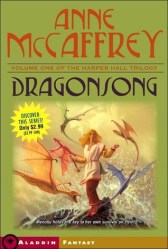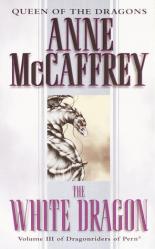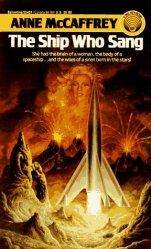I was so sad to hear that Anne McCaffrey had died.
I first read the news on GalleyCat, a blog about the publishing industry. Here is the obituary. The obituary reprints this advice from her blog:
“First – keep reading. Writers are readers. Writers are also people who can’t not write. Second, follow Heinlein’s rules for getting published: 1. Write it. 2. Finish it. 3. Send it out. 4. Keep sending it out until someone sends you a check. There are variations on that, but that’s basically what works.”
Which I think is good basic advice for all of us. It’s certainly what she did. To tell you why I was so sad, I have to tell you a bit about my childhood. It won’t surprise you, I’m sure, to learn that I was an inveterate nerd. In school I always felt like an outsider, partly because I liked to read when other children didn’t, and partly because I couldn’t for the life of me kick a ball. It would go off in the wrong direction. My family moved around a lot, and so I went to a lot of different schools. In sixth grade, I went to a school where the crucial social skill was playing kickball. I was hopeless.
That year, my best friend was named Amy. She was as much of a nerd as I was. I’m not sure which Anne McCaffrey book I read first. I think it may have been The White Dragon. But I was immediately hooked on Pern. I particularly liked the Harper Hall books, with Menolly. Her heros and heroines, like Jaxom and Menolly and Piemur, were outsiders as well. I could relate to them and to all their troubles. And of course I loved the dragons and fire lizards. What would I have given to have a fire lizard of my own? My soul, probably. Amy and I would swing on the swings near my house and talk about what it would be like if somehow, by accident, a dragon from Pern went between and ended up in a nearby field, and took us to Pern. Where we could be dragonriders, of course, and there was a particular dragonrider we were in love with, but I don’t remember his name.
I read a number of her books around that time, when I was twelve or thirteen. I remember The Ship Who Sang in particular, because it was a love story and a story about a woman who discovers her individuality and vocation. McCaffrey had female characters I could relate to. They were strong, flawed, but ultimately heroic. It was quite a change from Middle Earth and Narnia, where adult women are mostly absent or evil. I couldn’t imagine growing up to be the White Witch or Galadriel, but I could imagine growing up to be Lessa.
The other fantasy writer who influenced me deeply around this time was Ursula Le Guin, so I was influenced by two important female fantasy writers. Now that I think about it, Le Guin didn’t have those sorts of compelling female characters. I ask myself if that can be right, because I generally think of Le Guin as a strong feminist. But the character I remember most from her books is Ged. He’s the one who comes most alive for me.
From McCaffrey, I think I got my love of story. From Le Guin, I think I got my love for words and their power. Le Guin was the superior stylist. But McCaffrey had something that I think is important. Many years later, when I was in the middle of my PhD program and inclined to dismiss writers like McCaffrey as inferior to the literary writers I was reading, I decided to reread one of the Harper Hall books. At the time, I lived in an apartment with a claw-foot bathtub, and every night I took a long bubble bath. With a LOT of bubbles and a good book. I made the mistake of starting the book in the bathtub. An hour later, I was sitting in a cold bath, with no bubbles, unable to stop reading. I could see all the problems with her world – the aristocratic system was based on the work of “drudges” (yes, they were called that) who were barely characters at all. Lessa was a drudge, but like Cinderella, she was really the dispossessed heiress, so of course she would eventually regain her proper social role. So there was quite a bit to criticize – and yet, the woman could write a gripping story.
She had courage, too. After her divorce, she moved with her children to Ireland, living off child support payments and what she could earn by writing. I wish she hadn’t collaborated so much, and those collaborations aren’t novels I would read. But I will never judge another writer for how he or she makes money from writing. It’s just too hard of a profession to say, you shouldn’t have written that. She supported herself and her children, and that’s heroic.
I want to write another time about her novels, about what I think of them now, how they’ve influenced me. But this post is already long enough, and all I really want to say here is, Ms. McCaffrey, you were such an important part of my childhood, and part of the reason that I’m now a writer. I’m so sorry that you’re gone, but so glad that you were here for a while, and that you wrote your books. Thank you.





Le Guin’s most famous books were written earlier, and you can see the struggle to figure out how to write women characters — which she’s written about herself — how to find a way out of the established models. Because of who Le Guin is, she’s really not interested in the project of just swapping a woman into the traditional heroic “I kill all the bad guys now with my mightyness” role — not (pace Athena Andreadis) because she believes women and men are essentially different, but because she’s uncomfortable with that model of victory in the first place, and it looks to her like a big step backward to extend the domain of the hero-as-sociopath to the half of humanity usually spared it. But it’s pretty clear that her first attempt at resolving this is a failure, at least for me — in memory, Arha does not read as any kind of hero. While Menolly does, without kicking any kind of ass. By Tehanu, Le Guin I think has figured out a new kind of hero for both Ged and Tehanu to be, and certainly her later less well known stuff has plenty of attractive, capable adult (or young adult) female characters (I recently read Lavinia and Powers, for instance).
Ben, that’s a good point. I haven’t read Lavinia or Powers. I’m particularly interested in reading Lavinia, when I have time. I have to disagree a bit about Tehanu, because I didn’t find that book compelling. I love Le Guin dearly, but there are times when I feel as though she’s really working the politics, and it gets in the way of a satisfying story. For me, Tehanu focused a lot on how women are victimized without necessarily focusing on what they could do about that victimization (other than turn out to be dragons) or creating what I felt to be compelling characters. Whereas I do find Menolly a compelling character. I’ll have to read the later Le Guin, but now that I think of her books, I find a lot of compelling ideas, but not such a focus on characters in general. Which is all right — there are a number of writers I love that don’t necessarily write compelling characters. But I do think that’s a strength of McCaffrey’s — I still remember the names of her characters, whereas to be honest, I don’t remember many names from Le Guin, however much I love her stories.
When I first read Tehanu — when it came out — I absolutely hated it. Ten years or so later I re-read it and liked it probably best of all the Earthsea books. But I don’t really remember what shifted well enough to give an account of it. On that reading, it was The Other Wind that felt preachy — like the political Le Guin had to come in and tidy up any details that her subconscious had inflicted on Earthsea that didn’t accord with her policies. Liberating the land of the dead could have felt like a natural and resonant closure, but somehow it didn’t — it felt like a heavy-handed betrayal, a banishment of the numinous.
I’ll have to look at them again, because it’s been a couple of years. I think for me, all the books after the first three were attempts to deal with what she didn’t like politically about those first three — the all-male wizard class, for example. Funny, when you mention liberating the land of the dead, I’m reminded of Pullman in the Dark Materials books. I liked the first one, and then liked each subsequent one less because once again I felt as though the politics were intruding. But I don’t know, I was never bothered by the Christian message of the Narnia books, so I’m not sure why I should be bothered by what Le Guin or Pullman were doing. (Although I never believed the Christian message of the Narnia books either — there was too much pagan imagery to convince me. Too much Aslan!) I remember liking The Other Wind more? But I would definitely have to look at it again.
This is a great post. I so want to read the Pern books again, but I loved them so much as a kid, I’m scared to!
Interesting point about Le Guin’s female characters. I’m not a Tehanu fan (I’ve only read it once) & I haven’t read Lavinia, but I did and do love Tenar (a.k.a. Arha). She had to overcome her own training, and her love of power, in order to get back to herself.
I didn’t like Tenar at all when I first read the books, as a child. When I went back and read them as an adult, I liked and understood her a lot better. I think in a sense, the Earthsea books are sold as YA but really aren’t. They’re not Harry Potter. They’re really adult books sold as YA because they’re short and about magic.
I had the same reaction to His Dark Materials. Aviva and I are reading the first one together, but I don’t think we’ll bother with the others.
The Christianity in Narnia bothered the hell out of me once we got to The Last Battle. The other books are, if not pagan at heart, at least a product of an interesting battle between Lewis’s keenly intellectual and bracing Christianity and his romantic Greco-Roman classical Oxford-donnish whimsy. The Last Battle is not really parsible in any mode other than the theological, and theologically, it’s vile. I was entranced with the series, and its ending was a very large betrayal for a Jewish boy.
Le Guin, Pullman, Lewis… there seems to be a warning here, about series, and the politics taking over?
I hate The Last Battle! Deeply, passionately. It’s the book in which Lewis betrays his readers. And I agree about the interesting conflict between Christianity and the paganism implicit in his classical education. Yes, that’s an interesting observation about series, and a lesson to us all.
So true about the series. It’s as though each of them started with a magical moment, but the magic could not be sustained until the end. A point had to be made, and when that happened, the magic died.
Oddly, while I don’t think this happened with the Dragonriders of Pern series, I can’t read them, whereas I still reread the first 2 Earthsea books and have worn Narnia to shreds with my daughter (except The Last Battle and Prince Caspian which has no nasty theological surprises but is still somehow vaguely lame). (Neither of us can stand Pullman.) What does this mean? Perhaps that the most magical stories are the ones that have a weighty subtext, even one that’s not clear to the author at first. Or that the people who write those stories are also the people who care so deeply about the world they feel they MUST make a point, even at the risk of killing the magic.